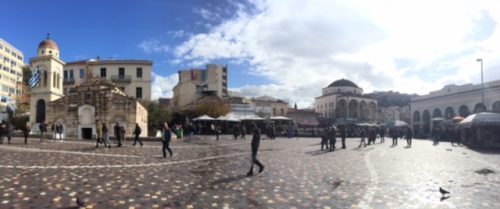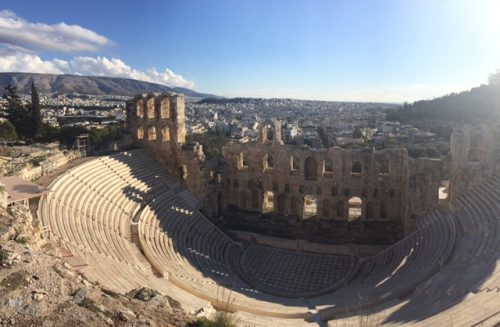 Even the softest step will awaken the Greek gods. You will find yourselves among the walls of history, take off the veil of 21st century and forget about contemporary myths of the modern world. Here, in Athens, you will be back in time at a glance, to the place where democracy was conceived and the first mechanical alarm clock was invented.
Even the softest step will awaken the Greek gods. You will find yourselves among the walls of history, take off the veil of 21st century and forget about contemporary myths of the modern world. Here, in Athens, you will be back in time at a glance, to the place where democracy was conceived and the first mechanical alarm clock was invented.

The flight of Alcyone
Beautiful Alcyone woke up that morning healthy and happy, eager to see her husband, Ceyx – the brave king of Thessaly.Waiting for a warm embrace, she received a message that her king will not return. Aegean Sea took him and does not want to give him back. Crushed with pain, not knowing how to survive without him, desperate Alcyone threw herself into the sea. But instead of waves dragging her to the bottom, she turned into a bird, a beautiful halcyon, rose above the restless waters and flew to her husband. Since then, she returns every winter to lay her eggs, and it is then when Alcyone’s father, Aeolus, the God of winds, tames the waves and calms the winds. According to the legend, two warm weeks every January are referred to as ,,halcyon days”, to signify a period of great peace and calm.

When the halcyon days arrive to Greece, Athens moves to the streets and squares. It opens its windows, and becomes loud again. At Plaka, the main promenade that lies beneath the Acropolis, the waiters are busy carrying tables out and placing paper tablecloths, knowing that during these days the life of the city will take place right here – with moussaka and mastika.
When you think about Greece, the first thing that comes to mind must be the summer and beautiful, sun-drenched islands. This is certainly with a good reason, it is one of the world's most beautiful coastlines. Hence, it is understandable that it sounds strange if you hear that perhaps the best time to visit and live the Athenian experience is winter. Pace yourself for a different experience, much more ,,greek” than the summer stroll along the beaches.
In colder months, Athens is just how the locals like it–with pleasant temperatures and without excited tourists who think one day in Athens is enough; to them it is a must-do, but a transit station, until they feel the sand of the Greek beaches. This is perhaps the biggest difference, the lack of crowds. This is the time when wandering the old streets decorated with neoclassical-style villas and facades painted in white, is not spoiled by tourists calling the waiters or bargaining about the price of lace shawls. It's quiet, and high above, the Parthenon looks noble and serene in the winter light.

Stage preserved by history
The day wasn’t called Friday back then. The phones didn’t need to be switched off before the play began. It wasn’t the done thing for women to take part in the performance.
Yet, the moon threw the same light on the stage, embellishing the heroes’ tragedies. The people shed the same tears and laughed to the same masterpieces. The seating was always, two thousand years ago as rocky and uncomfortable as it is today, as you sit on a tier of the Odeon Herodes Theater, ready to be swept up into an ancient Greek drama. According to ancient writings that were left behind, Herodotus is considered to be one of the best speakers of Greek civilization. This theater was built in year 161. in memory of his wife Regil who passed away young. Once, this semicircular theater was covered with high rooftop made of cedar wood and the main wall was decorated with ceramic mosaics. Today, almost two centuries later, the theater is still here. Now under an open sky, without mosaics and ornaments,it bears the burden of the ancient and the new time. It may be the impeccable acoustics, or the Parthenon that silently guards the theater above. It may be the gentle feel of the time-smoothed marble; or the melodic rhythm of Greek language. Whatever it is, this theater will take you through the time – whether you are watching a Greek tragedy or enjoying music concerts of world star performers.
A cathartic feeling will overwhelm you, as if you are both the hero and the poet, the mortal and the god. It is an indescribable feeling of being in the audience in an ancient Greek open-air theater, located in the historical center of Athens

Greek blues
Just south of the Plaka, Monastiraki Square is home to many taverns, it is a meeting point and the epicenter of urban life. One of these taverns was a witness of the first modern Olympic Games in 1896. The rustic interior and walls full of memories. Spiros Bariaktarisis a third generation of caterers in this tavern famous for its special way of preparing Greek specialty – souvlaki. The restaurateur, who proudly says that he enjoys his work every day for the last 60 years, says that he knows why guests always come back to this tavern. ,,To those who come we always look in the eye, never in their hands and money”, he added to explain that the recipe for success is easier if you have pure intentions and a little bit of luck. Nevertheless, good food is not the only thing that leaves these places without a single empty table. For complete indulgence another element is needed. Music. In ancient Greece it was considered a gift of the gods. It was related not only for celebrations, but for everyday tasks and work in the field, and every youngster had to play at least one instrument. Today, it is an indispensable part of everyday life, and in the taverns around Athens you can hear sounds of rebetiko. This kind of music was born in the Greek underworld, and was performed by the so-called rebetes – a class of society that was considered unconventional because they celebrated rebellious culture and opposed to the existing social status quo. Most often compared to American blues, or Portuguese fado – melodies are full of passion, love and bitterness. Imbued with the usual melancholy, they speak about lives and everyday struggles of ordinary people. When the sound of bouzouki streams through the air of the Greek capital, the time stops for a moment. You did not even notice, and it seduced you, slipped under your skin and somehow made you remember those nights you thought you've completely forgotten.
Just below the main city market, after another steep street that resembles the previous, in an old building with broken windows and abandoned apartments, there is another jewel of the Mediterranean hedonism. Diporto, through a game of words opens its two doors and serves the freshest of the day. The first liter of white wine will be on your table even though you did not order; the following will be sent by a cheerful group sitting in the corner that speaks one language with the music. Dimitris – the owner, chef and waiter pours wine and toasts with all seven tables that the entire inn counts. This is one of those places where you first open a tab, and then your soul. Wanting that I, the tourist, feel at home, with nimble fingers the music plays familiar tunes of the Balkan region. They say that in this old place that time has forgot about, they often feel overwhelmed with nostalgia and some better times, and wistfully talk about the red Yugoslav passport and Tito.

When the northeast wind visits the city and storms through the fields of Attica, sometimes it brings in the rain.It is than that Athens has a quiet, unusual beauty – wet marble light is refracted from a special golden Parliament in Syntagma Square. But don’t be fooled. This is not the rain that makes you close the windows and get comfortable in your bed; it is the one that reminds you to open your mind and marvel at the beauty different from what you imagined. From time to time, cities like this remind us that we need to find our little sun in rainy days, even when we cannot see it behind the clouds.
Aphrodite’s’ sunset
Sunset in Athens is a must see. A must do, a must experience. This magical window in time makes you wonder if the sun set that glides along the horizon of the Mediterranean sea, is an end to this day, or just the beginning of a new one. Lycabettus Hill, right above Syntagma Square sets a surreal view. Standing in this place, you will have the feeling that you hold the entire Athens in the palm of your hand; that you can hear all the intertwined lives that are happening there, under our knees. The bell from the church of St George will wake you from dreaming and remind you that this sunset tailored by Aphrodite lasts only for another quarter of the hour.

By late February, it seems like winter has almost left the streets of Athens. As soon as the first wild flower on Agora looks towards the sun, Plaka starts preparing for the summer season. However, only those who have visited the city during these halcyon days, will keep the true magic of Greece in their heart and they will carry it on their fingertips until next winter in Athens.
(Marija Rašović, originally from Podgorica, has a degree in journalism obtained at the Faculty of Political Sciences in Belgrade. She completed Masters in Madrid, and now lives and works in Abu Dhabi. And she travels… Her observations poured into words, esteem readers, you will be able to read here, on MNE magazine portal. )


